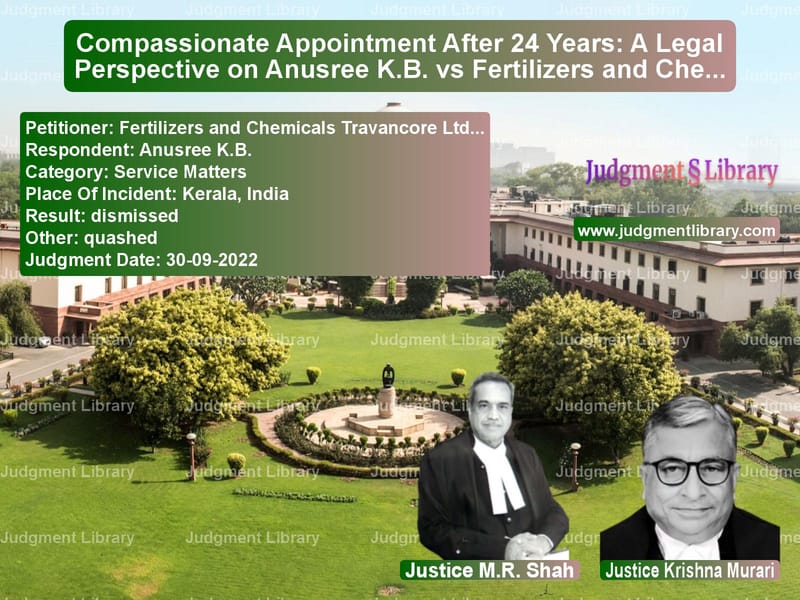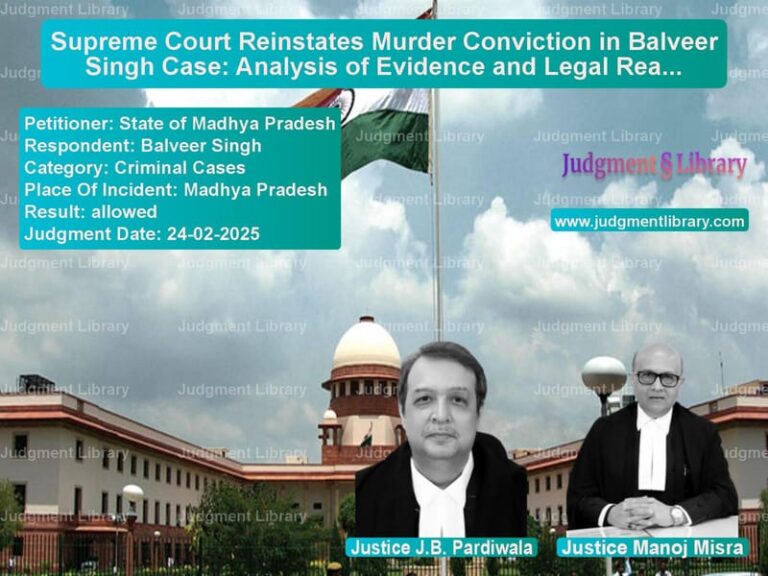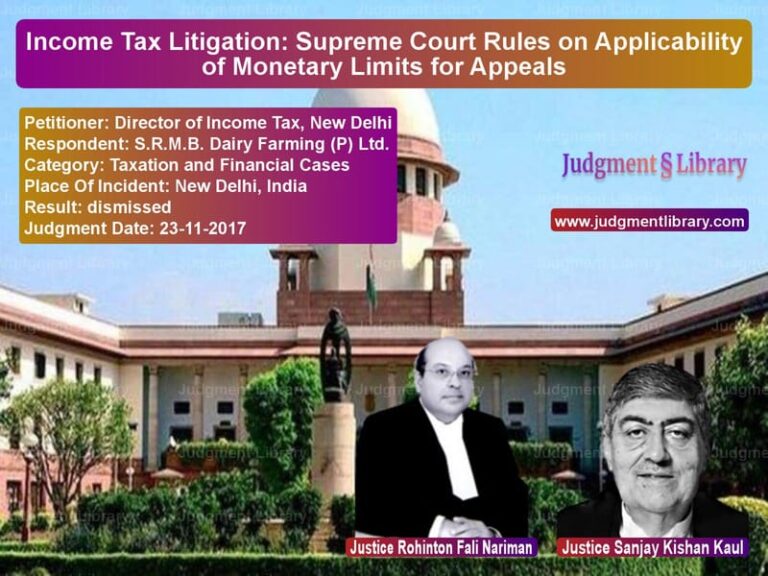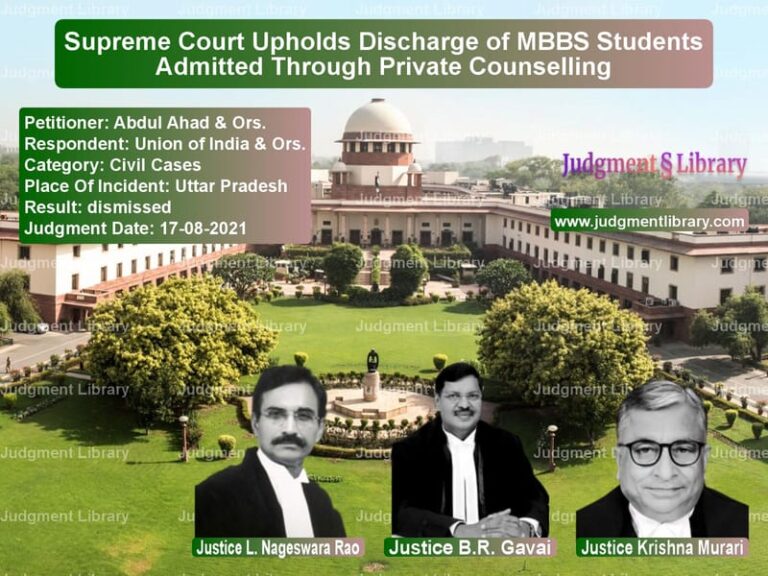Compassionate Appointment After 24 Years: A Legal Perspective on Anusree K.B. vs Fertilizers and Chemicals Travancore Ltd.
The case of Fertilizers and Chemicals Travancore Ltd. & Ors. vs Anusree K.B. raises significant legal questions about the eligibility and time limits for granting compassionate appointments to the dependents of deceased employees. Anusree K.B., the daughter of a deceased employee, sought an appointment under the compassionate grounds scheme after 24 years of her father’s passing. The company initially rejected her application, citing the significant delay and policy requirements, but the legal battle continued until it reached the Supreme Court. This case examines the key arguments from both sides and the court’s judgment on whether the passage of time should impact the eligibility for such appointments.
Background of the Case
Anusree K.B.’s father, a loading helper employed with Fertilizers and Chemicals Travancore Ltd., passed away in 1995. At the time of his death, his wife was gainfully employed, which disqualified her for a compassionate appointment under the company’s policy. However, after 14 years of the father’s death, Anusree applied for a compassionate appointment, but her application was rejected in 2018 due to a combination of the delay and her name not being listed as a dependent in the official records.
The Petitioner’s Arguments
The appellants, Fertilizers and Chemicals Travancore Ltd., argued that the compassionate appointment scheme was designed to provide immediate relief to the dependents of deceased employees, particularly in cases of sudden death. They pointed out that the delay in filing the application—24 years after the death—was far beyond what the scheme intended. The appellants also referenced legal precedents, including the cases of Director of Treasuries in Karnataka vs. V. Somyashree and N.C. Santhosh vs. State of Karnataka, to argue that such delays go against the purpose of the compassionate appointment, which is meant to address immediate financial hardship.
The Respondent’s Arguments
Anusree K.B.’s legal team, led by Senior Advocate Shri Sanjay Parikh, countered the argument by stating that she was a minor at the time of her father’s death and could not apply for the appointment until she came of age. After she turned 18, she promptly applied for the position. The defense also argued that the rejection of her application was not based on delay initially, and it was only later that the delay was cited as a reason for rejection. Furthermore, the respondent claimed that in 2018, she was even called for an interview but was then told that her name was not on the dependent’s list. This was later found to be factually incorrect, and the respondent argued that such administrative mistakes should not bar her from the compassionate appointment.
The Court’s Analysis
The Supreme Court considered both the statutory framework for compassionate appointments and the specific facts of the case. The Court acknowledged the purpose of the compassionate appointment policy, which is to provide immediate relief to families left in financial distress due to the sudden death of a breadwinner. However, the Court also noted that the policy is not meant to grant employment after long periods, particularly when the hardship that the policy is designed to mitigate—immediate financial distress—is no longer relevant after such a delay.
Furthermore, the Court highlighted that the issue of the delay in applying for the appointment was critical. The Court also considered the fact that the respondent’s mother, at the time of the father’s death, was gainfully employed, which disqualified her from receiving a compassionate appointment. The Court found that the death of the father in 1995 and the subsequent 24-year delay in filing the application was inconsistent with the purpose of the compassionate appointment policy, which is intended to offer relief immediately after the death of the employee.
Final Judgment
The Supreme Court ruled in favor of the appellants, holding that the respondent was not entitled to a compassionate appointment. The Court emphasized that the policy of compassionate appointments is based on addressing immediate financial distress, and providing an appointment 24 years after the death would go against the intent of the policy. The Court quashed the earlier orders of the High Court, which had directed the appellants to reconsider the respondent’s case, and upheld the decision of the company to reject the application based on the delay.
Significance of the Judgment
This case reinforces the principle that compassionate appointments are not a right but an exception meant to provide immediate relief in cases of sudden death of the breadwinner. The Court’s judgment clarifies that delays of more than two decades significantly dilute the purpose of such appointments and that the intention behind the scheme is to address the immediate hardships faced by the family members. The decision serves as a reminder that while the compassionate grounds scheme is meant to help families in distress, it cannot be extended indefinitely and should be used in a timely manner.
Petitioner Name: Fertilizers and Chemicals Travancore Ltd..Respondent Name: Anusree K.B..Judgment By: Justice M.R. Shah, Justice Krishna Murari.Place Of Incident: Kerala, India.Judgment Date: 30-09-2022.
Don’t miss out on the full details! Download the complete judgment in PDF format below and gain valuable insights instantly!
Download Judgment: fertilizers-and-chem-vs-anusree-k.b.-supreme-court-of-india-judgment-dated-30-09-2022.pdf
Directly Download Judgment: Directly download this Judgment
See all petitions in Employment Disputes
See all petitions in Public Sector Employees
See all petitions in Judgment by Mukeshkumar Rasikbhai Shah
See all petitions in Judgment by Krishna Murari
See all petitions in dismissed
See all petitions in Quashed
See all petitions in supreme court of India judgments September 2022
See all petitions in 2022 judgments
See all posts in Service Matters Category
See all allowed petitions in Service Matters Category
See all Dismissed petitions in Service Matters Category
See all partially allowed petitions in Service Matters Category







